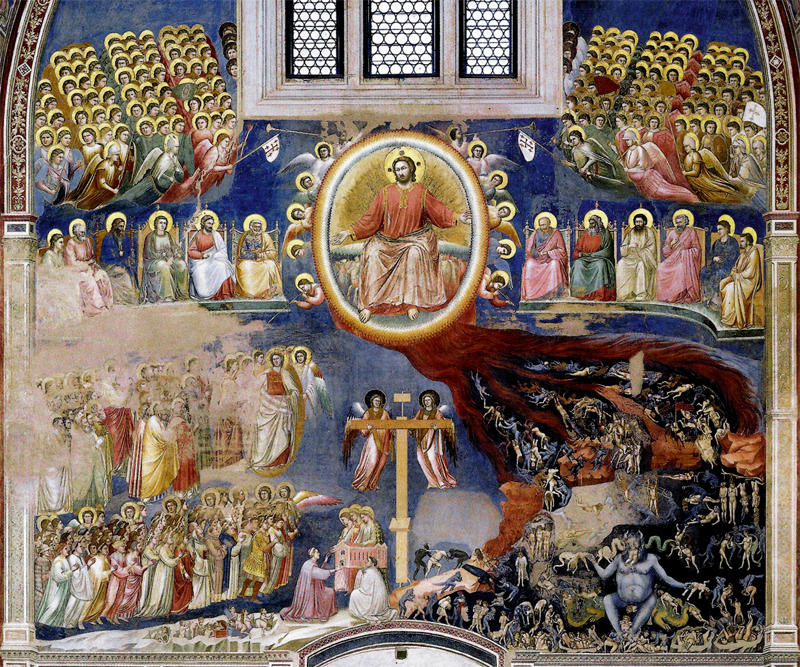
Many articles have been published throughout the Catholic world about Pope Francis’s change to the Catechism of the Catholic Church, stating that “the death penalty is inadmissible.”1 Such articles show how this statement contradicts Scripture and Tradition and represents a clear break with the constant teaching of the Church.
In these brief notes, we limit ourselves, however quickly, to one aspect: the statement’s errors in matters of punitive justice. As Pius XII says, such errors lead to a misunderstanding of divine justice and the existence of Hell.
Argument Without Consistency
The arguments for changing the Catechism were presented in a document of the Congregation for the Doctrine of the Faith, signed by the prefect, the recently-made Cardinal Luis F. Ladaria, S.J. and approved by the Pope. It sought to justify a rupture with the previous magisterium based on two presuppositions:
- that the criminal does not lose his human dignity; and
- that states today have efficient means of protecting the community without the use of the death penalty.2
This argumentation, actually mere sophistry, does not hold up to scrutiny, as we shall see below.
10 Razones Por las Cuales el “Matrimonio” Homosexual es Dañino y tiene que Ser Desaprobado
Is the Death Penalty Contrary to Human Dignity?
To argue that the death penalty is contrary to human dignity creates confusion by failing to distinguish between ontological order (human nature’s perfection) and moral order (conformity of human actions with right reason and divine law). While man never loses the ontological dignity of his nature, he does lose his moral dignity when he intentionally practices evil.
Furthermore, the argument of human dignity is not germane to the issue. This is because the object of justice is not human dignity, whether ontological or moral, but rather the voluntary acts of man in his relationships with others. As Saint Thomas Aquinas teaches:
“[T]he proper matter of justice consists of those things that belong to our intercourse with other men. … Hence the act of justice in relation to its proper matter and object is indicated in the words, ‘Rendering to each one his right’.”3
No one is condemned to a just punishment because of dignity or the lack thereof, but rather for concrete actions practiced against the common good.
Confusion About Punitive Justice…
To argue that modern states have supposedly better means to deal with criminals as a reason against death penalty is due to a poor understanding of punitive justice and the purpose of punishment. Such misunderstandings come from the idea that the end of punishment is seen only as a means to protect society or correct the malefactor.
Although punitive justice does have this twofold objective, it is not limited to them. Its most profound reason for being is the need for the guilty one to expiate for the crime committed and thus restore the juridical order undermined by his crime.
Eternal and Natural Law: The Foundation of Morals and Law
As we read in Victor Cathrein, S.J.’s Philosophia Moralis, “To correct the delinquent is the secondary end of public punishments; the primary end is the common good of society.”4
… Making it Difficult to Understand Divine Justice
The expiatory goal of punishment is all the more important since it is difficult to understand divine justice and the dogma of Hell without it. Since in the next life, the need for protection and the possibility of conversion are nonexistent, eternal punishment can be understood only as expiation for the evil committed and reparation of transgressed divine justice, representing the triumph of good over evil.
Crime Violates the Juridical Order
Let Pope Pius XII himself explain these concepts. Below are excerpts from his memorable speech at the Sixth Congress of International Penal Law on October 3, 1953. It is one of the most complete and systematic explanations by a pope on this matter (we have inserted subtitles for clarity).5
“Penal law is a reaction of the juridical order against the delinquent; it presupposes that the delinquent is the cause of the violation of the juridical order….
Science Confirms: Angels Took the House of Our Lady of Nazareth to Loreto
“At the moment of the crime, the delinquent has before his eyes the ban imposed by juridical order: he is conscious of it and of the obligation it imposes; but, nevertheless, he decides against his conscience, and to carry out his decision commits the external crime. That is the outline of a culpable violation of the law.
Modern Penal Theories Incomplete
“Most modern theories of penal law explain punishment and justify it in the last resort as a protective measure, that is, a defense of the community against crimes being attempted; and, at the same time, as an effort to lead the culprit back to observance of the law. In these theories, punishment may indeed include sanctions in the form of a reduction of certain advantages guaranteed by the law, in order to teach the culprit to live honestly; but they fail to consider expiation of the crime committed, which itself is a sanction on the violation of the law as the most important function of the punishment….
“Yet, from another point of view, and indeed a higher one, one may ask if the modern conception is fully adequate to explain punishment. The protection of the community against crimes and criminals must be ensured, but the final purpose of punishment must be sought on a higher plane.
The Essence of Punishment: to Proclaim the Supremacy of Good Over Evil
“The essence of the culpable act is the freely-chosen opposition to a law recognized as binding; it is the rupture and deliberate violation of just order. Once done, it is impossible to recall. Nevertheless, insofar as it is possible to make satisfaction for the order violated, that should be done. For the fundamental demand of justice, whose role in morality is to maintain the existing equilibrium, when it is just, and to restore the balance when upset. It demands that by punishment the person responsible be forcibly brought to order; and the fulfillment of this demand proclaims the absolute supremacy of good over evil; right triumphs sovereignly over wrong.
Learn All About the Prophecies of Our Lady of Good Success About Our Times
“Now we take the last step; in the metaphysical order the punishment is a consequence of our dependence on the supreme Will, a dependence which is written indelibly on our created nature. If it be ever necessary to repress the revolt of a free being and re-establish the broken order, it is surely here when the supreme Judge and His justice demand it. The victim of an injustice may freely renounce his claim to reparation, but as far as justice is concerned, such claim is always assured to him.
Need for Expiation, Protection of the Juridical Order
“The deeper understanding of punishment gives no less importance to the function of protection, stressed today, but it goes more to the heart of the matter. For it is concerned, not immediately with protecting the good ensured by the law, but the very law itself. There is nothing more necessary for the national or international community than respect for the majesty of the law, and the salutary thought that the law is also sacred and protected, so that whoever breaks it is punishable and will be punished.
“These reflections help to a better appreciation of another age, which some regard as outmoded, which distinguished between medicinal punishment – poena medicinalis – and vindictive punishment – poena vindicativae. In vindictive punishment the function of expiation is to the fore: the function of protection is comprised in both types of punishment.
Without Expiation, There Is No Understanding of Divine Justice
“Finally, it is the expiatory function which gives the key to the last Judgment of the Creator Himself, Who ‘renders to everyone according to his works’ (Matt. 16:27; Rom. 2:6). The function of protection disappears completely in the after-life. The almighty and all-knowing Creator can always prevent the repetition of a crime by the interior moral conversion of the delinquent; but the Supreme Judge, in His last judgment, applies uniquely the principle of retribution. This, then must be of great importance.”

Avoiding Doctrinal Ambiguity
Whatever position a person takes regarding the application of the death penalty according to the place or historical circumstances, we must always be careful to prevent ambiguity from shrouding the clear principles of natural law and Revelation on this matter.
Sentiment and Sentimentality
We live in a time dominated by emotionalism. Emotion takes the place of reason and sentimentality supplants true sentiment. Thus we must be careful and discuss doctrinal problems in the field of reason, not emotion.
Unfortunately, Pope Francis’s changing of the Catechism in this crucial point of correctly understanding human and divine justice, increase this deleterious climate of emotionalism that leads to a practical denial of the dogma of Hell.
Footnotes
- NEW REVISION OF NUMBER 2267 OF THE CATECHISM OF THE CATHOLIC CHURCH ON THE DEATH PENALTY – RESCRIPTUM “EX AUDIENTIA SS.MI”, http://www.vatican.va/roman_curia/congregations/cfaith/documents/rc_con_cfaith_doc_20180801_catechismo-penadimorte_en.html.
- CONGREGATION FOR THE DOCTRINE OF THE FAITH LETTER TO THE BISHOPS REGARDING THE NEW REVISION OF NUMBER 2267 OF THE CATECHISM OF THE CATHOLIC CHURCH ON THE DEATH PENALTY, http://www.vatican.va/roman_curia/congregations/cfaith/documents/rc_con_cfaith_doc_20180801_lettera-vescovi-penadimorte_en.html.
- Summa Theologica, II-II, q. 58, a. 1
- Barcelona: Editorial Herder, 1945, n. 735, obj. 3, Rep.
- Pius XII, Discorsi e Radiomessagi di Sua Santità Pio XII, (Vatican: Tipografia Poliglotta Vaticana), vol. XV, pp. 335-359; The Major Addresses of Pope Pius XII, Vincent A. Yzermans, ed. (St. Paul: The North Central Publishing Company, 1961), pp. 224-257. We use Yzermans’ translations.

